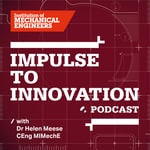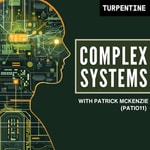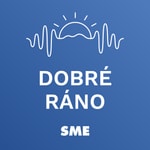Impulse To Innovation – Details, episodes & analysis
Podcast details
Technical and general information from the podcast's RSS feed.

Impulse To Innovation
IMechE I2I
Frequency: 1 episode/32d. Total Eps: 51

Recent rankings
Latest chart positions across Apple Podcasts and Spotify rankings.
Apple Podcasts
🇬🇧 Great Britain - techNews
19/06/2025#81🇬🇧 Great Britain - techNews
18/06/2025#69🇬🇧 Great Britain - techNews
17/06/2025#35🇬🇧 Great Britain - techNews
16/06/2025#20🇬🇧 Great Britain - techNews
19/04/2025#100🇬🇧 Great Britain - techNews
18/04/2025#77🇬🇧 Great Britain - techNews
17/04/2025#56🇨🇦 Canada - techNews
13/03/2025#92🇨🇦 Canada - techNews
12/03/2025#82🇨🇦 Canada - techNews
11/03/2025#62
Spotify
No recent rankings available
Shared links between episodes and podcasts
Links found in episode descriptions and other podcasts that share them.
See all- https://www.spacex.com/
268 shares
- https://fullycharged.show/
78 shares
- http://www.imeche.org/
41 shares
RSS feed quality and score
Technical evaluation of the podcast's RSS feed quality and structure.
See allScore global : 78%
Publication history
Monthly episode publishing history over the past years.
Season 5 Episode 6: Keeping Your Cool - How Engineering is Preparing Athletes for a Hot Olympics
Season 5 · Episode 6
lundi 29 juillet 2024 • Duration 56:04
As the Olympics gets underway, summertime temperatures will only continue to get hotter, giving athletes additional challenges as they seek to bring home medals.
With Paris 2024 taking place in the host city’s hottest months of the year, leading athletes are already warning that intense heat could lead to competitors collapsing and in worst case scenarios dying during the Games.
What role can engineering play in ensuring athletes, officials & volunteers, and those just watching the games, stay cool in an around the various sporting venues?
Dr Jo Corbett University of Portsmouth (right) conducting heat chamber tests in the University's Extreme Environments Laboratory with Jamie Farndale, a rugby 7s player for Great Britain. https://www.port.ac.uk/news-events-and-blogs/news/rings-of-fire-heat-risks-at-the-2024-paris-olympics
Helen's guests this month are Ruth Shilston and Professor Mike Tipton. They share their thoughts on the potential heat risks facing the Olympics this year, and in the future, in light of growing global temperatures, and how engineers are designing devices and building facilities to mitigate the effects of heat.
Nike Hyperice Vest - Nike Press Release 21st June 2024
Ruth Shilston is a fellow of the imeche and a current trustee and Technical Director of Engineering Sciences at Mott MacDonald. She has been a leading specialist on the engineering of major construction projects worldwide and is a subject matter expert in human thermal comfort and climate aware design as well as Author of numerous industry guidelines, technical and policy papers on heat adaption and construction.
Mike Tipton MBE is Professor of Human and Applied Physiology at the University of Portsmouth. Mike has spent 40 years working in the areas of thermoregulation, environmental and occupational physiology. He leads the Extreme Environments Laboratory, in the School of Sport, Health & Exercise Science at Portsmouth, examining the physiological, patho-physiological and psychological responses to adverse environments and the selection, preparation and protection of those who enter such environments. He has authored over 750 papers, reports and books on the subject and in April this year published the ‘Rings of Fire – Heat Risks at the 2024 Paris Olympics’ the second in this series of reports highlighting the worrying impact global warming and climate change is having on elite sports.
Useful Links:
Rings of Fire – Heat Risks at the 2024 Paris Olympics
Sustainable, Inclusive, Innovative: The Role Of Engineering In Sport
Heat Risks at the Paris Olympics
We would love to hear your thoughts and comments on this episode. If you would like to get in touch, email us at podcast@imeche.org
You can find more information about the work of the IMechE at www.imeche.org
Season 5 Episode 5: Enhanced by Engineering - Celebrating 105 Years of Pioneering Women Engineers
Season 5 · Episode 5
lundi 1 juillet 2024 • Duration 42:01
Sunday – 23rd June – marks the 11th annual International Women in Engineering Day (INWED), and as always we are celebrating the amazing contribution women engineers make, not just to the profession as a whole, but to society.
The 23rd June is significant as it marks the founding day in 1919 that a group of seven women from the National Council of Women met and signed a Memorandum of Agreement which created the Women’s Engineering Society WES.
The Original Pioneers - the gathering that became WES
WES’s early members were campaigners, hands on engineers, inventors, designers, electricians, pilots, managers and administrators. Many of its leaders and committee members were from the better-off industrial middle or upper classes, but the organisation’s work covered women working on the shop floor, making their way into management, those accessing formal education and even the female end users of engineering innovations such as the introduction of electricity into the home.
Since its inception, WES has become internationally recognised and continues to drive change in the industry; ensuring women have the opportunities to work and be educated in technical fields, and by campaigning for equal rights and equal pay in a sector which remains heavily male dominated.
2024 Winners of the Top 50 Women in Engineering Award - Seven of whom are IMechE members
My guests are Dawn Bonfield MBE president of the Commonwelth Engineer’ Council and past president and former chief executive of the Women's Engineering Society. Dawn was the founder of National Women in Engineering Day in 2014 and in 2015 established the inaugural 50 Women in Engineering List. A materials engineer by profession, working in the aerospace sector she now runs her own consultancy, Towards Vision, working on projects to improve inclusion in engineering
She was given an MBE in the 2016 Queen's Birthday Honours list for 'Services to the promotion of diversity in engineering'.
And Holley Reece-Barkell, is a fellow of the ImechE. She is Strategy & Growth Director for Frazer-Nash Consultancy and newly elected chair of the IMechE’s Diversity & Inclusion Committee. Holley has over 18 years experience in the consultancy sector and is responsible for developing the over-arching ‘’one Frazer-Nash strategy to drive growth across the business.
Holley brings a wealth of knowledge and experience to her appointment as D&I chair from her role as part of the team leading diversity and inclusion in the company, and is keen to ensure its employees feel empowered to achieve their personal and professional goals regardless of their circumstances, identity or background.
Useful Links:
International Women in Engineering Day 2024
Women's Engineering Society Website
IMechE members recognised as 2024 Top 50 Women Engineers
IMechE appoint Holley Reece-Barkell as EDI Chair
We would love to hear your thoughts and comments on this episode. If you would like to get in touch, email us at podcast@imeche.org
You can find more information about the work of the IMechE at www.imeche.org
Season 4 Episode 5: Levelling Up - What to Expect from the Introduction of T-Levels
Season 4 · Episode 5
mercredi 21 juin 2023 • Duration 46:03
The T-level was initially mooted back in 2017 by the British government as a new, unified technical qualification which would replace the BTEC and simplify vocational education routes.
After several years of development, The Department for Education (DfE) launched the t-level in 2020 with the aim of enabling students to directly enter employment on completion of a programme in further education or Sixth Form college.
The unique aspect of the T-levels is that the courses have been developed in collaboration with employers and education providers so that the content meets the needs of industry and prepares students for entry into skilled employment, an apprenticeship or related technical study through further or higher education.
The T-level is a 2-year course which can be taken after GCSEs and is broadly equivalent in size to 3 A Levels. It offers students practical and knowledge-based learning and on-the-job experience through an industry placement of approximately 45 days.
The first 16 have now been launched and all 24 T-levels will be available by 2024. Under the Engineering and Manufacturing T-level there is a choice of 3 courses:
- Design and Development for Engineering and Manufacturing
- Maintenance, Installation and Repair for Engineering and Manufacturing
- Engineering, Manufacturing, Processing and Control
To find out more about what this new vocational training programme would mean for the engineering industry Helen spoke with chartered engineers Lydia Amarquaye, professional development and education policy adviser for the IMechE and Andrew Livesey, consultant, further education lecturer, and author of T-Level Engineering - Technology, Manufacture and Maintenance
Lydia works with key stakeholders outside the IMechE to identify gaps in the education landscape which could help address workforce challenges and equip engineers with the right skills for a successful career. She also works with the Education and Skills strategy Board to develop the Institution’s strategic direction in education.
Andrew is an experienced company director as well as having authored several engineering textbooks. He is passionate about stem education and lectures at Ashford college in Kent. In 2018 his was part of the employer-led panel set up by the government to develop the T-levels in engineering.
In the first half of this episode Helen spoke with Lydia about how the IMechE was working with industry to ensure they understood the value of T-levels. In the second half Andrew talks to Helen about the importance of creating a flexible vocational qualification in engineering for young people and what he hoped the T-level would bring to the workplace.
Useful Links:
What Students need to know about T-levels
We would love to hear your thoughts and comments on this episode. If you would like to get in touch, email us at podcast@imeche.org
You can find more information about the work of the IMechE at www.imeche.org
Season 4 Episode 4: Leading from the Front - Equipping Young Engineers with Essential Management Skills
Season 4 · Episode 4
jeudi 18 mai 2023 • Duration 01:07:16
Leading and managing people, projects, or teams, requires more than a high degree of technical knowledge. Experience and education provide the foundation for success in an engineering manager's role, but it also requires a great deal of foresight and strategic thinking and just like any skill, becoming an effective manager and leader takes time and effort.
With businesses emerging from COVID-19 to a new and rapidly changing professional landscape, it is more critical than ever that companies take a proactive approach in developing and supporting engineering leaders of the future. Remote and hybrid working practices are now routine for many businesses and employees, and organisations can no longer rely on young engineers picking up communication and teamwork skills ‘by osmosis’ in the office environment.
The IMechE’s Essential Management Skills conference has been running for over 20 years and offers three days of workshops, networking, and site visits to equip early-career professionals with the knowledge they need to make the step up in their careers. Helen had the opportunity to attend this year's conference in April, to find out more about the value of leadership training, some 20-odd years since she last went to it.
Before she arrived Helen spoke with Dr Vasileios Samaras, a senior lecturer in Mechanical Engineering at the University of Swansea, and a fellow of the IMechE. Vasileios teaches the principles and application of leadership and management to undergraduates and having spent many years in industry before returning to academia, is keen to ensure young engineers are well prepared for the challenges that leadership brings.
Stephen Brown is the chair of the EMS organising committee and got involved having previously attended the conference as a delegate. He found the conference to be extremely insightful and feels that all early careers and recent graduates should take the opportunity to attend.
Emma Wilson is one of the delegates attending the conference from Howden based in Scotland. Helen asked Emma why having the opportunity to learn about leadership early in her career, was so important, and what she hoped to take away with her from the experience.
Maira Bana is Co-Chair of the IMechE’s Construction and Building Services Division and an ambassador for She Can Engineer. She also attended EMS back in 2018. Poppy Harrison is a young engineer; D&I officer for the Greater London region and one of the organising committee members for the EMS 2023/24 conference. Helen spoke to both of them about the conference itself, why it is important from a D&I perspective and how leadership in industry has changed over the last 10 years.
Paul Taylor has been providing training in the IMechE for many years and feels leadership and management skills are a fundamental part of what it means to be an engineer. Helen asked Paul to share his thoughts from a trainer’s point of view.
Jack is a young engineer working at Sellafield and is looking to move into his first leadership role. Helen asked him why his company felt leadership and management skills were valuable to them.
Robin Safas is Programme Development Lead for the IMechE. It’s his job to ensure events such as the EMS run smoothly by supporting the organising committees in developing and planning their events. Robin sees this conference as an investment in the careers of future engineers and a way for companies to empower their workforce.
Robyn Stark, is also a an engineer from Howden. As a recent graduate she felt that she was a long way from being a leader in her career, but she recognised that the skills she was learning would be very useful for building relationships with her colleagues in the future.
David Edmondson, is one of the guest speakers at the conference who has had a varied career in both the military and industry and feel passionate about leadership training and how engineers can learn from best practice in the armed forces.
Useful Links:
IMechE Training - Early Career Development Programme
Details of the Essential Management Skills 2023
PE Magazine Report on Sustainability
We would love to hear your thoughts and comments on this episode. If you would like to get in touch, email us at podcast@imeche.org
You can find more information about the work of the IMechE at www.imeche.org
Season 4 Special Episode: Augmenting Human Cognition – The Growth of Artificial Intelligence & Machine Learning
Season 4 · Episode 31
mercredi 26 avril 2023 • Duration 02:05:26
The idea of 'a machine that thinks' dates back to ancient Greece times, but since the advent of electronic computing and the overwhelming amount of data generated by the human race in the last 50 years, the realisation of intelligent machines that can think like humans has been almost tangible.
In 1950 Alan Turing published his seminal work Computing Machinery and Intelligence. In the paper, Turing proposed to answer the question "Can machines think?" and introduced the Turing Test to determine if a computer could demonstrate the same intelligence as a human.
In 1956 John McCarthy coined the term 'artificial intelligence' at the first-ever AI conference at Dartmouth College saying Artificial intelligence, " …is the science and engineering of making intelligent machines, especially intelligent computer programs. It is related to the similar task of using computers to understand human intelligence, but AI does not have to confine itself to methods that are biologically observable."
Today, there is a great deal of hype surrounding AI systems and intelligent machine development, which is of course to be expected of any new emerging technology. But what exactly is AI and what does it mean for the world of mechanical engineering?
In this I2I podcast special, Helen speaks with Neil Lawrence and Alan King about what AI and machine learning is all about, what their uses will be, and how engineers will benefit from using these systems in their working environments.
Professor Neil Lawrence is the inaugural DeepMind Professor of Machine Learning at the University of Cambridge, Senior AI Fellow at The Alan Turing Institute, and Visiting Professor of Machine Learning, University of Sheffield.
He received his bachelor's degree in Mechanical Engineering from the University of Southampton in 1994 and spent his early career as a field engineer on oil rigs in the North Sea. He has been working on machine learning models for over 20 years and recently returned to academia after three years as Director of Machine Learning at Amazon where he worked on deploying machine learning solutions for Prime Air, Alexa and the Amazon supply chain.
Alan King is Head of Global Membership Strategy at the Institution of Mechanical Engineers. He joined IMechE as a Business Development Executive in 2004 with a background in both engineering and business. His father, both an engineer and joint owner of an engineering firm, introduced Alan to engineering at an early age and he then combined his fascination for the subject with an interest in business at university, studying for a Master's in International Business.
As the Head of Global Membership Strategy, Alan supports the development of IMechE's comprehensive 5-year strategy. Collaborating with organisations worldwide, his team delivers exceptional support to IMechE members while crafting engaging membership marketing content for pivotal campaigns throughout the year.
Alan is now focusing his attention on how Artificial Intelligence could enhance both member services and support staff in their everyday tasks within the IMechE. He also recently wrote a fascinating article for Institution News on the practical applications of AI and Machine Learning in the engineering sector.
Useful Links:
Challenges in Deploying Machine Learning - Case Studies
How AI is Already Changing Engineering and the Role of the Engineer
Understanding Artificial Intelligence
PE Magazine report on Sustainability
We would love to hear your thoughts and comments on this episode. If you would like to get in touch, email us at podcast@imeche.org
You can find more information about the work of the IMechE at www.imeche.org
Season 4 Episode 3:The Hydrogen Economy - A New Fuel for a Net Zero Future
Season 4 · Episode 3
lundi 3 avril 2023 • Duration 46:48
The UK’s first-ever Hydrogen Strategy was released in 2021 and was revised last year, as part of the Government’s commitment to a green industrial revolution. The strategy lays the foundation for how Government will work with industry to meet its ambition for 10GW of low carbon hydrogen production capacity by 2030 – the equivalent of replacing natural gas in powering around 3 million UK homes each year, as well as powering transport and businesses, particularly heavy industry. This has the potential of delivering emissions savings equivalent to the carbon captured by 700 million trees.
A UK-wide hydrogen economy could be worth £900 million and create over 9,000 jobs by 2030, with the potential to increase to 100,000 jobs and £13 billion by 2050.
In the coming years hydrogen could play an important role in decarbonising polluting, energy-intensive industries like chemicals, oil refineries, power and heavy transport like shipping, HGV lorries and trains, helping these sectors move away from traditional fossil fuels.
With Government analysis suggesting that 20-35% of the UK’s energy consumption by 2050 could be hydrogen-based, this new energy source could be critical to meet the UK's target of net zero and could help to cut emissions by 78% by 2035.
But is this just a flight of fantasy by the UK Government or a real opportunity for the UK to lead the way in hydrogen technology and production?
To find out more about hydrogen as a fuel source, its application in the aviation industry and what a hydrogen economy looks like, Helen spoke with engineers Tim Podesta & Stephen Phillips.
Tim is a consultant engineer with over 30 years’ experience in the oil, gas, petrochemical and energy industries, focusing on project management, investment analysis and process improvement. Tim’s focus is on the net zero agenda and the potential for a hydrogen economy alongside clean electricity. He is actively involved in the IMechE’s Hydrogen forum which has been set up to look at the long-term implications of hydrogen as an alternative fuel. Tim is a fellow of the Imeche and a committee member of the Institution’s Management Group
Stephen is a sustainable aerostructures lead engineer with Spirit AeroSystems and has been actively involved in working with the Aerospace technology Institute on their FlyZero project to realise zero-carbon emission commercial aviation by 2030. He is a chartered mechanical engineer has recently become the chair of the aerospace division at the IMechE.
Useful Links
If you would like to speak to a member of the Hydrogen Technical Committee or get involved with its work please contact IMechE Enquiries at enquiries@imeche.org
Aerospace Technology Institute FlyZero Project
PE Magazine report on Sustainability
We would love to hear your thoughts and comments on this episode. If you would like to get in touch, email us at podcast@imeche.org
You can find more information about the work of the IMechE at www.imeche.org
Season 4 Episode 2: Manufacturing a New Future - Resilience in the Face of Unprecedented Challenges
Season 4 · Episode 2
mardi 7 mars 2023 • Duration 56:48
Its safe to say that the engineering community has been under a great deal of strain over the last few years, with socio-economic and political upheaval across the global. None-more-so than the manufacturing industry.
Both here in the UK and worldwide, the manufacturing sector is facing a number of urgent challenges which are driving transformational change across the entire industry. The ambition to reach Net Zero, finding reliable access to sustainable resources, and the accelerating pace of emerging technologies and workforce mobility are some of the key issues the industry is having to address.
Manufacturing executives are now not only being held accountable by their shareholders for the company’s bottom line but they are now, more than ever, being scrutinised by the public and policy makers for the adherence to sustainable processes and supply chain management.
Despite all these challenges the manufacturing industry has managed to remain resolute; finding new ways to address sourcing bottlenecks, logistics backlogs and supply chain collapse. By creating resilience in their networks and apply new tools and approaches such as distributed manufacturing, manufacturers are turning critical risks into strategic advantage.
To find out more about the last few years of challenges, Helen spoke with engineers Nigel Pekenc and Professor Kostantinos Salonitis to get their views on emerging transformations and whats next for the manufacturing industry.
Nigel is a Partner in Kearney’s Strategic Operations Practice, based in London. He has advised clients in industries from engineered equipment to healthcare. Nigel has been focused on the reconfiguration of global value chains to meet changing needs as supply and demand shocks continue.
Kostas is Head of the Sustainable Manufacturing Systems Centre and the Deputy Director of Manufacturing at Cranfield University. He is a Fellow of the IMechE and chair of Manufacturing Industries Division. His current research focus is on the sustainability of manufacturing systems and processes, the design and optimization of manufacturing systems, and the use of lean and green approaches for managing manufacturing.
We would love to hear your thoughts and comments on this episode. If you would like to get in touch, email us at podcast@imeche.org
You can find more information about the work of the IMechE at www.imeche.org
Season 4 Episode 1: Strategy & Impact - IMechE’s Aspirations for 2023
Season 4 · Episode 1
mardi 7 février 2023 • Duration 44:18
Hello and welcome to the new season of Impulse to Innovation.
Believe it or not, as of the end of December 2022 we have produced 30 episodes of the podcast, reaching 98 countries with over 14 ½ thousand downloads. Thank you so much to you, our listeners for continuing to support our show, we really appreciate it.
Don’t forget you can subscribe to the show here on our main site or via any podcast services you use. If you prefer, you can also listen to us on the IMechE’s website via the newly embedded audio link on the home page. We also love hearing from our listeners so don't forget you can email us via Podcast@imeche.org Let us know what you think of the show, experiences you’d like to share with us or even to give us ideas for things you’d like to hear.
We have some fascinating engineering topics planned for the coming year, including innovations in composite materials, how measurement standards are created and maintained and energy and transport issues. We will be looking at the latest developments in education and skills for engineers, as well as the public perception of our profession.
We will also be sharing some of the policy work the HQ team will be undertaking and the extensive events calendar planned by both the technical divisions and groups as well as across our 16 regions. There's going to be something for everyone.
In this month's episode Helen kicks off with a look at what the year ahead has in store for the IMechE; focusing on the Institution’s up-coming strategy release in May and its 2023 aspirations, as well as the role the Technical Strategy Board plays in ensuring the IMechE’ s members have a platform to share the latest thinking and expertise from its 18 groups and divisions.
Helen's guests are James Partington and Paul Jones.
James is the newly appointed Director of Engineering Policy and Impact and joined the Institution in October last year with the task of ensuring members’ engineering expertise is heard as widely as possible in Government and the broader community.
Paul Jones is a Fellow of the Institution, Past Chair of the Automobile Division and is presently the chair of the Technical Strategy Board, one of 7 operational boards, which provide insight and guidance to the Trustees. Helen spoke with Paul on the podcast this time last year and wanted to catch up with him to get his thoughts on the past year of events and happenings in the divisions and groups, as well as discuss the vital work being carried out by the TSB members in creating a long-term plan to raise the voice of mechanical engineering and generate greater impact in society.
We would love to hear your thoughts and comments on this episode. If you would like to get in touch, email us at podcast@imeche.org
You can find more information about the work of the IMechE at www.imeche.org
Season 3 Episode 11: Sustainable Healthcare – Creating a Net Zero NHS
Season 3 · Episode 11
mardi 6 décembre 2022 • Duration 56:05
Despite the all-consuming mission of the global healthcare sector to ‘do no harm’ and protect society from illness, disease, and death it is, according to NGO ‘Health Care Without Harm’, the fifth largest emitter of global emissions on the planet.
Indeed, healthcare’s climate footprint is estimated to be 4.4% of global net emissions; that’s equivalent to the output from 514 coal fired power stations, making it comparable in significance to the food sector in terms of climate impact. It seems ludicrous to think that the act of caring for those suffering from health conditions brought about by climate change, is partially responsible for their condition in the first place.
It is quite clear then, that the healthcare sector, both clinical and technological, must address their alarming contribution to the climate crisis. A two-pronged approach is needed, one which treats those made ill, injured, or dying from the climate crisis, and the second which drastically reduces its own innate contribution.
Many of the leading global healthcare companies and health service providers are already implementing sweeping changes and here in the UK the National Health Service (NHS) is leading the way. The paradox for the NHS is that while it accounts for around 5% of the country’s carbon emissions it also provides over 7% of the UK’s GDP, buying in goods and services from over 930 suppliers. Recognising its responsibility, In 2020 the NHS became the first national health system in the world to commit to delivering a net zero service by 2040 through its ‘Greener NHS’ initiative.
To achieve this, it will not only have to change the way it cares for patients across the hospital network; by opting to use more sustainable methods of treatment, but it will have to radically transform the way it selects and uses products and services, driving change across its entire supply chain network. The NHS believes that reaching the Paris Climate Change Agreement could see over 5,700 lives saved from improved air quality, 38,000 lives saved from a more physically active population and over 100,000 lives saved from healthier diets, each year.
The NHS and other global healthcare organisations cannot make these changes alone. Engineering will and is playing a significant role in improving care provision and in developing the technology that clinicians use. It is then, engineering that will drive the development and adoption of sustainable and green technology alternatives for the healthcare sector going forward.
In this month's episode Helen speaks to Dr Nick Watts Chief Sustainability Officer of the NHS, who knows just how critical tackling the NHS’ sustainability issues are and what it’s responsibility is to addressing the climate crisis.
Nick is responsible for the NHS’s commitment to deliver a world-class net zero emission health service. He leads the ‘Greener NHS team’ across the UK, which focuses on improving the health of patients and the public through a robust and accelerated response to climate change and broader sustainability agenda.Nick is a medical doctor licensed in Australia and the UK, and has trained in population health and public policy. He is a Member of the Royal College of Physicians’ Faculty of Public Health, and an Honorary Associate Professor of University College London’s Institute for Global Health.
Prior to the National Health Service, Nick worked internationally as the Executive Director of the Lancet Countdown and the Lancet Commission on Health and Climate Change, a collaboration of UN agencies and academic centres across the world. He has also focused on engaging the health profession on the links between public health and climate change, having founded both the Global Climate and Health Alliance and the UK Health Alliance on Climate Change.
Useful Links
Season 3 Episode 10 Part 2: Protecting the Past - Exploring Heritage Conservation Engineering
Season 3 · Episode 11
lundi 28 novembre 2022 • Duration 45:02
In the second part of this month’s episode Helen speaks with Ian Clark, managing director of Ian Clark Restoration and Engtech fellow of the institution.
Ian is unreservedly passionate about the restoration and preservation of our historical and technological achievements, and it has been a part of his life for over 40 years. He has worked with the likes of english heritage, the national trust and hundreds of national and international organisations, conserving firearms, statutes, submarines, windmills and everything in between. He has received numerous awards for his work and his advocacy of conversation engineering and has played a leading role as a committee member of the heritage awards.
In part two of this episode on conservation engineering, Ian shares his thoughts on the value and legacy of the heritage awards and some of the ones that have significant meaning to him, why the preservation of buildings such as our own Birdcage Walk is so important and what his hopes are for the future of the heritage industry.
We would love to hear your thoughts and comments on this episode. If you would like to get in touch, email us at podcast@imeche.org
You can find more information about the work of the IMechE at www.imeche.org








